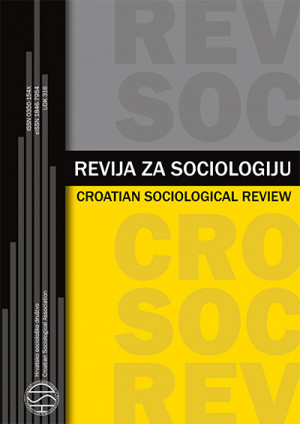Kritička analiza ideoloških diskursa u procesu europske statističke harmonizacije: slučaj Hrvatske
Critical Analysis of Ideological Discourses in the Process of European Statistical Harmonisation: the Case of Croatia
Author(s): Nevena JerakSubject(s): Government/Political systems, Politics and society, Nationalism Studies, EU-Accession / EU-DEvelopment, Sociology of Politics
Published by: Hrvatsko sociološko društvo
Keywords: official statistics; statistical harmonisation; inter-institutional power relations; Croatian Bureau of Statistics; Eurostat; critical discourse analysis;
Summary/Abstract: The process of European statistical harmonisation implies continuous harmonisation of statistical methodology, business and IT processes and IT solutions. It is based on the generic and standardised information concepts and methods, a common legal framework and terminology as well as on the modular and interoperable IT infrastructure. In the context of this article, statistical harmonisation is related to the harmonisation of the Croatian system of official statistics with the European Statistical System, coordinated by the European Commission via Eurostat. The Croatian Bureau of Statistics is the main national carrier and coordinator of the official statistics and the main representative of the Croatian statistical system before the European and international authorities responsible for statistics. As its part, the Croatian statistical system is largely dependent on the European Statistical System. In this paper, critical discourse analysis was used to analyse Eurostat’s control mechanisms over the national statistical authority, which enable and legitimise the interaction between these two participants in the process of statistical harmonisation. To assess the extent to which the ideological discourses of the European statistical harmonisation structured the national statistical institution, eighteen semi-structured interviews were conducted with employees of the Croatian Bureau of Statistics. A sample of intensity was used. It included informants that are familiar with the research topic as they frequently communicate and collaborate with colleagues from Eurostat on the harmonisation of statistical and information systems. Based on the results, it was concluded that the negative connotation of Eurostat’s authority, acquired prior to Croatia’s accession to the European Union, has changed in the discourse of the Croatian Bureau of Statistics after the accession, with Eurostat gaining an authority of a role model. However, the Croatian Bureau of Statistics has yet to evolve from a passive follower of Eurostat’s requests to an equal member of the European Statistical System with an active role in the creation of statistical harmonisation processes.
Journal: Revija za sociologiju
- Issue Year: 46/2016
- Issue No: 3
- Page Range: 241-269
- Page Count: 29
- Language: Croatian

